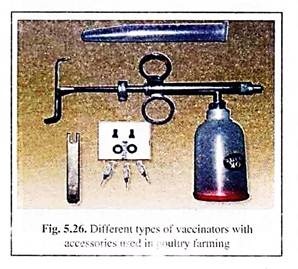The following points highlight the thirteen main ways for prevention of diseases in birds.
1. Clean sanitary conditions of poultry sheds and equipment, balanced feed, fresh clean water, healthy chicks are essential to prevent diseases. Entry of visitors to farm, especially inside the sheds must be restricted. Visitors should dip their feet and hands in a disinfectant solution and wear apron/boots provided by the farm.
2. Proper vaccination schedule must be maintained.
3. High quality vaccines should be purchased from reputed manufacturers. Vaccines should be kept in cool, dry conditions away from sunlight. Any leftover vaccine should be properly disposed. Vaccines should not be used after their expiry date is over.
ADVERTISEMENTS:
4. Vaccination will be done with proper sterile vaccinators (Fig. 5.26).
5. Any dead bird should be immediately removed from the shed and sent to laboratory for post-mortem examination or buried/burnt suitably away from the poultry sheds.
6. The waste of farm should be suitably disposed. Different workers should be employed in brooding and laying sheds.
ADVERTISEMENTS:
7. Any bird showing advanced signs of a disease should be removed from the shed and culled. It can be sent to laboratory for diagnosis.
8. Birds showing advanced signs of a disease should be shown to a qualified veterinarian and suitable medication/treatment should be given as per doctors or drug manufacturer’s recommendations.
9. Poultry manure, if infections, can spread disease from one batch to another. The litter is to be kept dry and removed after the flock is sold. The infected manure should be disposed off quickly.
10. Dates of vaccination for each flock should be properly recorded. Mortality and its causes and the treatment given to birds should be properly recorded.
ADVERTISEMENTS:
11. Rats are important carriers of poultry disease. To avoid rats suitable rat poison/rat trap is to be used.
12. Many poultry medicines can be given along with drinking water. When medication is to be given, removal of the waterers in poultry sheds on the previous evening is necessary. Next morning medicine in measured quantity of water should be employed, so that entire medicine is quickly consumed and there is no wastage.
13. Mild infection of disease may not cause mortality but it will reduce growth. Proper recording of body weight for growers, mortality rate and egg production is necessary.
Identifying the possible causes, if weight is low or egg production is low and taking steps to improve the management of the subsequent batches would prevent losses. A constant vigil and analysis of records/results are necessary to keep up the efficiency in farming.
